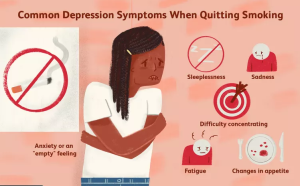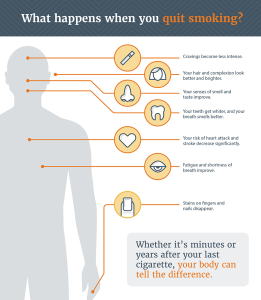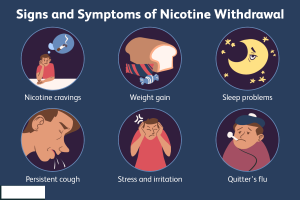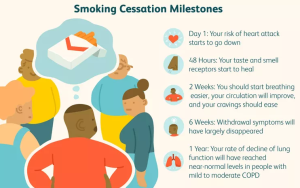Deciding to quit smoking is a big step toward better health, but it’s often not an easy path.
Many find themselves feeling worse in the months following their last cigarette, a phenomenon experienced by most ex-smokers.
Our guide aims to shed light on these post-quitting challenges, combining insights from global studies and health experts.
We’ll help you understand the body’s reaction to quitting nicotine and offer easy-to-follow advice for coping with these changes, guiding you through each step towards a healthier, smoke-free life.

When you stop smoking, your body starts a significant adjustment phase. Used to nicotine, it now has to function without it, often leading to feelings of anxiety and stress.
The study ‘To start and quit smoking cigarettes: an evaluation of students in a Nigerian city‘ by O.A. Atoyebi, an Associate Professor of Surgery and Consultant Surgical Gastroenterologist and Endocrinologist at the College of Medicine, University of Lagos, reflects these challenges.
It points out that stress and peer pressure, which often lead to smoking, can also complicate quitting.
This research, alongside resources like Healthline, stresses the importance of understanding these factors in the quitting process.
Chinedu’s experience, a 32-year-old graphic designer from Lagos, illustrates this.
He narrates, “After I quit smoking, the first few months were the toughest
“I experienced intense cravings and mood swings that made my days unpredictable. There were times when I felt so irritable that I couldn’t focus at work.
“But understanding that these were normal withdrawal symptoms made me feel less alone in my struggle. I kept reminding myself that this was just a phase and it would pass. And it did, gradually.”
 Physical and psychological changes
Physical and psychological changes
Quitting smoking brings both physical and mental changes.
Your body is healing and getting used to a life without nicotine, which can cause nicotine cravings, changes in appetite, and sleep issues.
Mentally, you might feel irritable or struggle to concentrate. The Mayo Clinic notes these as normal responses in adapting to a new, smoke-free routine.
Insights from Nigerian smokers
The “Correlates of quit intentions among current Nigerian smokers” research led by Dr. Oluwatomi Iken offers significant insights into the smoking cessation process in Nigeria. It found that many Nigerian smokers are in the pre-contemplation stage, not yet ready to quit.
This lack of readiness can lead to stronger post-quit symptoms, as the study suggests, underlining the need for targeted support for smokers at different stages of quitting.
 Common post-quit symptoms
Common post-quit symptoms
Intense cravings for nicotine: The World Health Organization (WHO) states that nicotine cravings are one of the most significant withdrawal symptoms due to its addictive nature. These cravings are acknowledged as a major hurdle in the quitting process.
Mood swings and irritability: The Canadian Cancer Society notes that mood swings and irritability are common after quitting smoking. The absence of nicotine affects mood regulation, leading to these emotional changes.
Weight gain from increased appetite: Health Canada reports that many people experience an increase in appetite after quitting smoking, leading to weight gain. This is because nicotine suppresses appetite, so its absence can increase feelings of hunger.
 Difficulty concentrating: According to the European Respiratory Society, difficulty concentrating is a common nicotine withdrawal symptom. The brain has to adjust to functioning without nicotine, which previously acted as a stimulant.
Difficulty concentrating: According to the European Respiratory Society, difficulty concentrating is a common nicotine withdrawal symptom. The brain has to adjust to functioning without nicotine, which previously acted as a stimulant.
Sleep disturbances: The Australian Government Department of Health mentions that quitting smoking can lead to sleep disturbances. Nicotine influences sleep regulation, so stopping smoking can disrupt normal sleep patterns.
These symptoms are part of the natural process of quitting smoking, as recognized by health organizations globally. Managing these symptoms effectively is crucial in the journey to becoming smoke-free.

Managing post-quit symptoms
Develop new habits: Replacing smoking with healthier activities like exercise or engaging in hobbies is essential. This approach aligns with findings from Dr. Margaret N. Aghaji’s study in Enugu, Nigeria, which underscores the importance of engaging in alternative activities for successful smoking cessation.
These activities help divert attention from cravings and foster positive behavioral changes.
Seek social support: Joining support groups or talking to friends and family about your quitting journey can provide crucial support. Dr. Aghaji’s research highlights the role of social support in quitting smoking. Sharing experiences with others who understand can offer both emotional support and practical advice.
 Mindfulness and relaxation techniques: Techniques like meditation, yoga, or deep breathing can help manage stress and mood swings. Such practices are beneficial in calming the mind and reducing cravings, as endorsed by various health organizations.
Mindfulness and relaxation techniques: Techniques like meditation, yoga, or deep breathing can help manage stress and mood swings. Such practices are beneficial in calming the mind and reducing cravings, as endorsed by various health organizations.
Professional help: Counselling or behavioral therapy can be vital in addressing the psychological aspects of addiction. The study from Enugu, Nigeria, suggests the need for professional support in the quitting process, echoing the participants’ expressed need for assistance.
 Nutritional adjustments: A balanced diet helps manage potential weight gain and improves overall health during the quitting process. Lifestyle changes, including dietary adjustments, are key components of a successful quitting strategy, as indicated in Dr. Aghaji’s study.
Nutritional adjustments: A balanced diet helps manage potential weight gain and improves overall health during the quitting process. Lifestyle changes, including dietary adjustments, are key components of a successful quitting strategy, as indicated in Dr. Aghaji’s study.
Conclusion
In concluding, the journey to quit smoking is undeniably challenging, yet it’s a path laden with profound benefits for your health and well-being. As we’ve explored, this journey is accompanied by a range of physical and psychological changes – from nicotine cravings to mood swings, and from increased appetite to sleep disturbances.
These are natural, albeit tough, parts of the quitting process recognized by health organizations worldwide.


